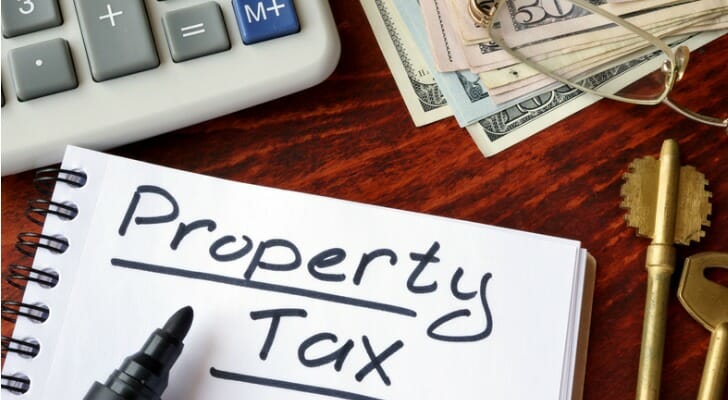

Owning a rental property can help you to grow wealth long-term and diversify your income streams. Receiving regular rental income can help supplement withdrawals you might make from a 401(k) or an individual retirement account (IRA) in retirement or give you an extra cushion in addition to your regular paychecks if you’re still working. But rental income isn’t tax-free money; you do have to pay the IRS taxes on the income you earn. Capital gains tax can also apply when you sell a rental property.
Do you have questions about planning for real estate investing? Consider speaking with a financial advisor today.
A financial advisor may be able to help. Match with an advisor serving your area today.
There are two dimensions to the tax picture when talking about rental properties. First, there’s the tax you pay on rental income paid to you. And second, there’s the taxes you might pay if you were to sell a rental property for a profit.
In terms of taxes on rental income, it’s subject to the same treatment as any earned income you might have from working or side-hustling. In other words, rental income is taxed as ordinary income at whatever your regular tax bracket may be for the year. The good news is, you can reduce what you owe in income taxes on rental income by claiming deductions for depreciation and rental expenses, such as maintenance, upkeep and repairs.
When you sell a rental property, you may owe capital gains tax on the sale. Capital gains tax generally applies when you sell an investment or asset for more than what you paid for it. The short-term capital gains tax rate is whatever your normal income tax rate is and it applies to investments you hold for less than one year. So, for 2024, the maximum you could pay for short-term capital gains on rental property is 37%.
The table below breaks down the 2024 short-term capital gains tax rates by filing status:
| Rate | Single | Married Filing Jointly | Married Filing Separately | Head of Household |
|---|---|---|---|---|
| 10% | $0 – $11,600 | $0 – $23,200 | $0 – $11,600 | $0 – $16,550 |
| 12% | $11,600 – $47,150 | $23,200 – $94,300 | $11,600 – $47,150 | $16,550 – $63,100 |
| 22% | $47,150 – $100,525 | $94,300 – $201,050 | $47,150 – $100,525 | $63,100 – $100,500 |
| 24% | $100,525 – $191,950 | $201,050 – $383,900 | $100,525 – $191,950 | $100,500 – $191,950 |
| 32% | $191,950 – $243,725 | $383,900 – $487,450 | $191,950 – $243,725 | $191,950 – $243,700 |
| 35% | $243,725 – $609,350 | $487,450 – $731,200 | $243,725 – $365,600 | $243,700 – $609,350 |
| 37% | $609,350+ | $731,200+ | $365,600+ | $609,350+ |
Long-term capital gains tax rates are set at 0%, 15% and 20%, based on your income. These rates apply to properties held for longer than one year. If you own rental property as an investment year over year, you may be more likely to deal with the long-term capital gains tax rate. If you’re interested in minimizing capital gains tax on rental property or avoiding it altogether, there are three avenues open to you.
For reference, this table breaks down the 2024 long-term capital gains tax rates by filing status:
| Rate | Single | Married Filing Jointly | Married Filing Separately | Head of Household |
|---|---|---|---|---|
| 0% | $0 – $47,025 | $0 – $94,050 | $0 – $47,025 | $0 – $63,000 |
| 15% | $47,025 – $518,900 | $94,050 – $583,750 | $47,025 – $291,850 | $63,000 – $551,350 |
| 20% | $518,900+ | $583,750+ | $291,850+ | $551,350+ |
Tax-loss harvesting is a strategy that allows you to balance out capital gains with capital losses in order to minimize tax liability. So, if your rental property appreciated significantly in value since you purchased it but your stock portfolio tanked, you could sell those stocks at a loss to offset capital gains.
Essentially, this could cut your capital gains tax bill to zero if you have enough investment losses to cancel out the profits. This strategy assumes, of course, that some of your other investments didn’t perform as well over the previous year.
If your entire portfolio did well over the past year then you may need to consider other ways to cut your taxes than loss harvesting. Or it may not yield enough of a benefit to offset all of your capital gains from selling a rental property.

Section 1031 of the Internal Revenue Code allows you to defer paying capital gains tax on rental properties if you use the proceeds from the sale to purchase another investment. You don’t get to avoid paying taxes on capital gains altogether; instead, you’re deferring it until you sell the replacement property.
There are a few rules to know about Section 1031 exchanges. First, this is a like-kind exchange, which means that the rental property you buy must be the same type of property as the one you sold. The good news is the IRS allows for some flexibility in how like-kind is defined.
So, for example, if you own a duplex and you decide to sell it, then use the proceeds to purchase a single-family rental home. That could still meet the criteria for a 1031 exchange.
You also need to be aware of the timing when executing a 1031 exchange. If you want to use this strategy to avoid capital gains tax on a rental property, you must have a potential replacement property lined up within 45 days. The closing on the new property must be completed within 180 days. If you don’t meet those deadlines, you’ll owe capital gains tax on the sale of your original rental property.
Again, a 1031 exchange doesn’t let you off the hook for paying capital gains tax on rental property. But it could buy you time for paying those taxes owed if you’re interested in swapping out your rental property for a new one.
One perk of being a homeowner is that the IRS offers a significant tax break if you sell at a profit. Single filers can exclude up to $250,000 in gains from the sale of a primary home from taxation. That amount doubles to $500,000 for married couples who file a joint return.
If you like your rental property enough to live in it, you could convert it to a primary residence to avoid capital gains tax. There are some rules, however, that the IRS enforces. You have to own the home for at least five years. And you have to live in it for at least two out of five years before you sell it.
This might be something to consider if you’re no longer interested in owning a rental property for income or you’d like to move from your current home into the rental.

Capital gains tax on rental properties can quickly add up if you’re able to sell a property you own for a large profit. Keeping an eye on conditions in the housing market and reviewing your overall financial situation can help you determine whether it’s the right time to sell to minimize taxes. For example, if your regular income is down for the year, then selling a rental property at a capital gain may not carry as much of a sting if you’re in a lower tax bracket. Talking to a financial advisor can help you find the best ways to manage capital gains tax.
Photo credit: ©iStock.com/xeni4ka, ©iStock.com/designer491, ©iStock.com/supawat bursuk
Rebecca Lake, CEPF®Rebecca Lake is a retirement, investing and estate planning expert who has been writing about personal finance for a decade. Her expertise in the finance niche also extends to home buying, credit cards, banking and small business. She's worked directly with several major financial and insurance brands, including Citibank, Discover and AIG and her writing has appeared online at U.S. News and World Report, CreditCards.com and Investopedia. Rebecca is a graduate of the University of South Carolina and she also attended Charleston Southern University as a graduate student. Originally from central Virginia, she now lives on the North Carolina coast along with her two children. Rebecca also holds the Certified Educator in Personal Finance (CEPF®) designation.
Read More About Taxes



More from SmartAsset
SmartAsset Advisors, LLC ("SmartAsset"), a wholly owned subsidiary of Financial Insight Technology, is registered with the U.S. Securities and Exchange Commission as an investment adviser. SmartAsset's services are limited to referring users to third party advisers registered or chartered as fiduciaries ("Adviser(s)") with a regulatory body in the United States that have elected to participate in our matching platform based on information gathered from users through our online questionnaire. SmartAsset receives compensation from Advisers for our services. SmartAsset does not review the ongoing performance of any Adviser, participate in the management of any user's account by an Adviser or provide advice regarding specific investments.
We do not manage client funds or hold custody of assets, we help users connect with relevant financial advisors.
This is not an offer to buy or sell any security or interest. All investing involves risk, including loss of principal. Working with an adviser may come with potential downsides such as payment of fees (which will reduce returns). There are no guarantees that working with an adviser will yield positive returns. The existence of a fiduciary duty does not prevent the rise of potential conflicts of interest.